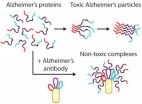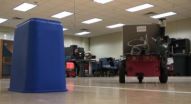(Press-News.org) The ability of male chimpanzees to form coalitions with one another in order to direct aggression at other male chimpanzees has certain benefits. A new study by Ian Gilby at Duke University in North Carolina and his colleagues has further revealed that it may not just be the coalition that is important, but who the coalition is with that determines future success. Their study finds that male chimpanzees with central positions in the coalitionary network were most likely to father offspring and increase in rank. Specifically, those who formed coalitions with males who did not form coalitions with each other were the most successful. Their work is published in the Springer journal Behavioral Ecology and Sociobiology.
Coalitionary aggression is when at least two individuals jointly direct aggression at one or more targets. Aggression and coalition formation between males is important for attaining a higher dominance in many animal species. The most dominant males are more likely to mate and therefore, sire offspring. Males with high coalition rates are more likely to mate more often than expected for their rank.
Gilby and his colleagues studied data from wild chimpanzees gathered over 14 years from the Kasekela community in Gombe National Park in Tanzania. They wanted to test the hypothesis that male coalitionary aggression leads to positive benefits via increased dominance rank and improved reproductive success. Of the four measures they used to characterize a male's coalitionary behavior, the only one that was related to both of these factors was 'betweenness' – a measure of social network centrality – which reflects the tendency to make coalitions with other males who did not form coalitions with each other. The only non-alpha males to sire offspring were males that had the highest 'betweenness' scores. These males were also more likely to increase in rank, which is associated with higher reproductive success.
The researchers postulate that this shows that male chimpanzees may recognize the value of making the 'right' social connections. By choosing their coalition partners carefully, they are demonstrating an ability to recognize the relationships of others.
The authors conclude that "…our data suggest that there are consequences to the recognition of third party relationships. As such, it represents an important step toward a more complete understanding of the adaptive value of social intelligence and the evolution of co-operation." They add that further observation is required to fully explain the study's findings.
### Reference:
Gilby IC, Brent LJN, Wroblewski EE, Rudicell RS, Hahn BH, Goodall J and Pusey AE (2012). Fitness benefits of coalitionary aggression in male chimpanzees. Behavioral Ecology and Sociobiology. DOI 10.1007/s00265-012-1457-6
The full-text article is available to journalists on request.
Male chimpanzees choose their allies carefully
Study finds male chimpanzees may increase their chances of siring offspring by recognizing the importance of third-party relationships
2012-12-03
ELSE PRESS RELEASES FROM THIS DATE:
Research explores markers of depression from childhood to adulthood
2012-12-03
Although several studies have followed the course of depression throughout the lifespan, the characteristics of depression at different developmental stages haven't been clearly identified. New research published in Clinical Psychological Science, a journal of the Association for Psychological Science, presents a unique longitudinal investigation of depression across four critical developmental periods from childhood to adulthood.
To better understand the developmental course of Major Depressive Disorder (MDD), Paul Rohde of the Oregon Research Institute and colleagues ...
Experts urge rapid evaluation for swallowing and voice problems after brain surgery
2012-12-03
Johns Hopkins experts are recommending early post-surgical assessment
-- preferably within 24 hours -- for trouble chewing and swallowing
food, or speaking normally, among patients who have had benign tumors
removed from the base of the brain.
Such early assessments, they say, may minimize complications
associated with the sometimes hazelnut-sized tumors, called
vestibular schwannomas. Damage can arise when the tumors themselves
press on the nearby cranial nerves -- key to controlling the tongue,
lips, mouth and throat -- or from the surgery itself.
Researchers ...
Leuven research opens new pathway for the treatment of Alzheimer's disease
2012-12-03
Scientists from VIB and KU Leuven have discovered a new target molecule for the development of a treatment against Alzheimer's disease. There is currently no cure for this disease. Many candidate drugs fail because they also target proteins essential to life. This discovery from Leuven could form a target for a treatment against Alzheimer's disease with fewer side effects and that suppresses the very first symptoms of the disease. This research will be published in the leading journal Nature Medicine.
Alzheimer's Disease
Alzheimer's Disease is the most common form of ...
Uncovering unique properties in a 2-dimensional crystal
2012-12-03
When the dry lubricant, molybdenum disulfide, is stripped down to a single layer of atoms, a tightly bound quasi-particle comprised of two electrons and a hole forms with unique spin and valley properties, researchers from Case Western Reserve University and colleagues discovered.
These charged quasi-particles, called negative trions, can be manipulated to change the light absorbed and emitted from this two-dimensional semi-conducting crystal, opening it to potential use in new solar cells and other electronic devices that are controlled by light or designed to control ...
Sharp spike in computer-related injuries predicted for medical workers, find studies
2012-12-03
ITHACA, N.Y. – As U.S. health care goes high tech, spurred by $20 billion in federal stimulus incentives, the widespread adoption of electronic medical records and related digital technologies is predicted to reduce errors and lower costs – but it is also likely to significantly boost musculoskeletal injuries among doctors and nurses, concludes a Cornell University ergonomics professor in two new papers.
The repetitive strain injuries, he said, will stem from poor office layouts and improper use of computer devices.
"Many hospitals are investing heavily in new technology ...
Cancer screening: The efficacy of mammography screening
2012-12-03
How effective is the German mammography screening program? This is the question examined by Oliver Heidinger of the Epidemiological Cancer Registry North Rhine–Westphalia and his co-authors in the first study on this subject in Germany, in Deutsches Ärzteblatt International (Dtsch Arztebl Int 2012; 109(46): 781-7).
To answer it, the authors have used the interval cancer rate as an indicator. Interval cancers are tumors found more or less by chance between two screenings. In approximately 880 000 women from North Rhine–Westphalia who had taken part in mammography screening ...
New 'pipeline' device offers new option for difficult-to-treat aneurysms
2012-12-03
Philadelphia, Pa. (December 3, 2012) – A new technology called the Pipeline embolization device (PED) shows encouraging results in patients with certain types of difficult-to-treat brain aneurysms, reports the December issue of Neurosurgery, official journal of the Congress of Neurological Surgeons. The journal is published by Lippincott Williams & Wilkins, a part of Wolters Kluwer Health.
Data collected since the PED was approved for marketing show generally good results in "real world" clinical practice. However, the report raises concerns about fatal bleeding and other ...
Novel antibodies for combating Alzheimer's and Parkinson's disease
2012-12-03
Troy, N.Y. – Antibodies developed by researchers at Rensselaer Polytechnic Institute are unusually effective at preventing the formation of toxic protein particles linked to Alzheimer's disease and Parkinson's disease, as well as Type 2 diabetes, according to a new study.
The onset of these devastating diseases is associated with the inappropriate clumping of proteins into particles that are harmful to cells in the brain (Alzheimer's disease and Parkinson's disease) and pancreas (Type 2 diabetes). Antibodies, which are commonly used by the immune system to target foreign ...
Awareness is key to preventing heat- and cold-induced athletic injuries
2012-12-03
ROSEMONT, Ill.—Extreme heat or cold can cause dangerous and potentially fatal side effects in athletes. A literature review appearing in the December 2012 issue of the Journal of the American Academy of Orthopaedic Surgeons (JAAOS) provides an overview of the risk factors, signs and symptoms, and management of various conditions related to excessive heat and cold exposure.
"Both extreme heat and cold can be challenging for athletes during training and competition," said lead study author Benjamin Noonan, MD, MS. "One role of the team physician is to educate coaches and ...
Squirrels and birds inspire researchers to create deceptive robots
2012-12-03
Using deceptive behavioral patterns of squirrels and birds, researchers at the Georgia Institute of Technology have developed robots that are able to deceive each other. The research is funded by the Office of Naval Research and is led by Professor Ronald Arkin, who suggests the applications could be implemented by the military in the future. The research is highlighted in the November/December 2012 edition of IEEE Intelligent Systems.
Arkin and his team learned by reviewing biological research results that squirrels gather acorns and store them in specific locations. ...
LAST 30 PRESS RELEASES:
Children with poor oral health more often develop cardiovascular disease as adults
GLP-1 drugs associated with reduced need for emergency care for migraine
New knowledge on heritability paves the way for better treatment of people with chronic inflammatory bowel disease
Under the Lens: Microbiologists Nicola Holden and Gil Domingue weigh in on the raw milk debate
Science reveals why you can’t resist a snack – even when you’re full
Kidney cancer study finds belzutifan plus pembrolizumab post-surgery helps patients at high risk for relapse stay cancer-free longer
Alkali cation effects in electrochemical carbon dioxide reduction
Test platforms for charging wireless cars now fit on a bench
$3 million NIH grant funds national study of Medicare Advantage’s benefit expansion into social supports
Amplified Sciences achieves CAP accreditation for cutting-edge diagnostic lab
Fred Hutch announces 12 recipients of the annual Harold M. Weintraub Graduate Student Award
Native forest litter helps rebuild soil life in post-mining landscapes
Mountain soils in arid regions may emit more greenhouse gas as climate shifts, new study finds
Pairing biochar with other soil amendments could unlock stronger gains in soil health
Why do we get a skip in our step when we’re happy? Thank dopamine
UC Irvine scientists uncover cellular mechanism behind muscle repair
Platform to map living brain noninvasively takes next big step
Stress-testing the Cascadia Subduction Zone reveals variability that could impact how earthquakes spread
We may be underestimating the true carbon cost of northern wildfires
Blood test predicts which bladder cancer patients may safely skip surgery
Kennesaw State's Vijay Anand honored as National Academy of Inventors Senior Member
Recovery from whaling reveals the role of age in Humpback reproduction
Can the canny tick help prevent disease like MS and cancer?
Newcomer children show lower rates of emergency department use for non‑urgent conditions, study finds
Cognitive and neuropsychiatric function in former American football players
From trash to climate tech: rubber gloves find new life as carbon capturers materials
A step towards needed treatments for hantaviruses in new molecular map
Boys are more motivated, while girls are more compassionate?
Study identifies opposing roles for IL6 and IL6R in long-term mortality
AI accurately spots medical disorder from privacy-conscious hand images
[Press-News.org] Male chimpanzees choose their allies carefullyStudy finds male chimpanzees may increase their chances of siring offspring by recognizing the importance of third-party relationships

